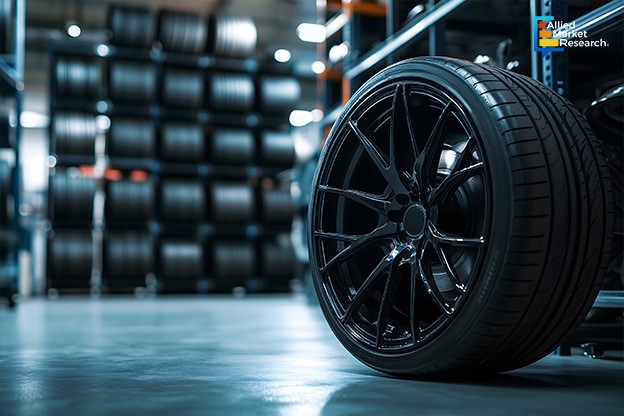Analyzing the Latest Trends and Advancements in the Automotive Aluminum Wheels Industry

11 Mar
2025
Key takeaways:
- Introduction
- Recent advancements in the automotive aluminum wheels market
- Mergers and acquisitions in the industry
Automotive aluminum wheels are mainly made from aluminum-nickel alloys, but sometimes aluminum-magnesium alloys are used too. In the last few decades, the growing sales of passenger and heavy vehicles have led to a surge in demand for the automotive aluminum wheels market. Furthermore, the shift toward electric mobility has increased the adoption of EVs and hybrid vehicles, thus expanding the scope of the automotive aluminum wheels industry.
Along with this, a major factor that has increased the revenue share of the automotive aluminum wheels industry is the growing preference for aesthetically appealing vehicle add-ons. These aluminum alloy discs provide a distinctive finish and a sophisticated look to the automobile, thus increasing its demand among a wider consumer base.
Innovations in wheel manufacturing creating new investment opportunities
Over the years, aluminum alloys have become one of the most preferred raw materials for manufacturing automotive wheels. Compared to steel discs, these alloys are much lighter which directly contributes to a reduction in the vehicle’s weight. Furthermore, lighter automotive wheels increase the payload capacity of the automobile and improve the overall handling and agility of the vehicle. These advantages are especially important for commercial vehicles and delivery trucks employed by logistics companies wherein maximizing cargo enhances the profitability of the business.
Apart from this, automotive aluminum wheels offer excellent resistance to corrosion and abrasion as compared to steel discs, which increases their lifespan. In the long run, this enhances the overall durability of aluminum products, thereby reducing the cost of repair and replacement. However, in contrast to steel alloys, these discs are more prone to cracking under pressure. To address this issue, companies are developing advanced products that are more robust and resilient than conventional wheels. For instance, the use of forged aluminum to produce automotive tire discs is an emerging trend witnessed in the industry. This material is manufactured under high pressure which helps companies to design a denser and stronger wheel.
Moreover, automotive companies are increasingly opting for additive manufacturing techniques such as 3D printing to reduce the wastage of raw materials and bring down the cost of production. Furthermore, resource optimization has also enabled businesses to lower the carbon footprint of their operations, thus ensuring environmental sustainability. Also, many automakers are proactively switching to eco-friendly alternatives such as recycled aluminum to minimize the impact on global ecosystems.
M&A deals generating profitable opportunities in the sector
Along with the growing demand for aluminum alloy wheels, the strategic alliances established by major companies are expected to expand the scope of the market in the coming period. The automotive aluminum wheels industry is expected to gather a revenue of $37 billion by 2032, rising at a CAGR of 7.7% during 2023-2032. For instance, in February 2023, Uno Minda Group, a leading manufacturer of proprietary automotive solutions, announced that it had bought a 100% stake in Minda Kosei Aluminium Wheels, a joint venture firm, from its Japanese firm, Kosei. In the last few years, Uno Minda has emerged as one of the major automotive OEM suppliers and this business move is anticipated to strengthen its product portfolio in the near future.
In June 2023, Breck Partners, LLC, a private equity firm, announced the acquisition of Alloy Wheel Repair Specialists (AWRS), a key alloy wheel maintenance and repair services provider. Prior to this acquisition, AWRS had established itself as a major supplier of automotive services to around 85 franchise locations. This strategic alliance enabled Breck Partners to expand its operations in various regions across the globe and build new client networks. Furthermore, the press release issued by the company states that Breck Partner aims to expand its customer base by offering world-class remanufacturing services in the coming period.
To sum it up, the automotive aluminum wheels market is predicted to witness a huge growth owing to the rising sales of EVs and hybrid cars across the globe. Along with this, the rising preference for aluminum alloys over steel discs is predicted to help the landscape flourish. Also, technological advancements in manufacturing processes and the transition toward sustainability are anticipated to influence the growth of the sector.
Contact our experts for tips and recommendations on how to capitalize on the opportunities offered by the industry!

Akhilesh Prabhugaonkar
Author's Bio- Akhilesh Prabhugaonkar holds a bachelor’s degree in Electronics Engineering from the reputed Vishwakarma Institute of Technology. He has a special interest in the fields of forensics, world history, international relations and foreign policy, sports, agriculture, astronomy, security, and oceanography. An ardent bibliophile and melophile, Akhilesh loves to write on topics of his interest and various other societal issues. This love for writing made him enter the professional world of content writing and pursue his career in this direction.
Avenue: Entire Library membership of Allied Market Research Reports at your disposal
- Avenue is an innovative subscription-based online report database.
- Avail an online access to the entire library of syndicated reports on more than 2,000 niche industries and company profiles on more than 12,000 firms across 11 domains.
- A cost-effective model tailored for entrepreneurs, investors, and students & researchers at universities.
- Request customizations, suggest new reports, and avail analyst support as per your requirements.
- Get an access to the library of reports at any time from any device and anywhere.
Related Post
-
How are Submarine Cables Transforming Global Connectivity with Enhanced User Experience?
-
Endoscopy Procedures: Transformations in Techniques and Applications
-
AI-Powered Video Analytics: How the Product Actually Works for enterprises
-
Painting Robots: Transforming Precision Coating and Creative Applications
-
Innovations in Pharmacovigilance Systems Advancing Patient Safety
-
Understanding Edge Security: Keeping Data Safe Near the Source
-
Exploring the Use and Advancements of 3D Laser Scanners in Professional Applications
-
Reinforcing Industrial Controls with Smarter Tools and Training








